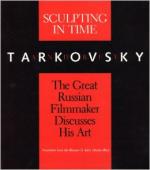
|
| Name: _________________________ | Period: ___________________ |
This quiz consists of 5 multiple choice and 5 short answer questions through Chapter VII.
Multiple Choice Questions
1. What film did Tarkovsky produce in 1979?
(a) Nostalgia.
(b) Stalker.
(c) The Sacrifice.
(d) Ivan's Childhood.
2. Who penned the novel, Joseph and His Brothers?
(a) Alexander Grin.
(b) Thomas Mann.
(c) Leo Tolstoy.
(d) Ernest Hemingway.
3. Who directed the film, Persona?
(a) Donatas Banionis.
(b) Igmar Berman.
(c) Robert Bresson.
(d) Sergei Eisenstein.
4. What term means a statement or proposition that seems self-contradictory or absurd, but in reality expresses a possible truth?
(a) Paradox.
(b) Trigger.
(c) Retreat.
(d) Falsehood.
5. What does Tarkovsky write "has taken a wrong turn in abandoning the search for the meaning of existence in order to affirm the value of the individual for its own sake"?
(a) Mankind.
(b) The Realistic Movement.
(c) Modern art.
(d) Dadaism.
Short Answer Questions
1. Whose dictum states: "in every sense, art is made for you, the people"?
2. Tarkovsky claims that In cinema, man's innate drive to what, finds one of its fullest and most direct means of realization?
3. In what year did Tarkovsky die?
4. When was the film Andrei Rublev released?
5. Tarkovsky asserts in Chapter I that the artist should be free to bring his own what to a film?
|
This section contains 180 words (approx. 1 page at 300 words per page) |

|




